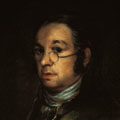








(VERONESE)
JOHN RUSKIN
This picture is at Turin, and is of quite inestimable value. It is hung high; and the really principal figure—the Solomon, being in the shade, can hardly be seen, but is painted with Veronese's utmost tenderness, in the bloom of perfect youth, his hair golden, short, crisply curled. He is seated high on his lion throne; two elders on each side beneath him, the whole group forming a tower of solemn shade. I have alluded, elsewhere, to the principle on which all the best composers act, of supporting these lofty groups by some vigorous mass of foundation. This column of noble shade is curiously sustained. A falconer leans forward from the left-hand side, bearing on his wrist a snow-white falcon, its wings spread, and brilliantly relieved against the purple robe of one of the elders. It touches with its wings one of the golden lions of the throne, on which the light also flashes strongly; thus forming, together with it, the lion and eagle symbol, which is the type of Christ, throughout mediæval work. In order to show the meaning of this symbol, and that Solomon is typically invested with the Christian royalty, one of the elders by a bold anachronism, holds a jewel in his hand in the shape of a cross, with which he (by accident of gesture) points to Solomon; his other hand is laid on an open book.

The Queen of Sheba.
Veronese.
The group opposite, of which the Queen forms the centre, is also painted with Veronese's highest skill; but contains no point of interest bearing on our present subject, except its connection by a chain of descending emotion. The Queen is wholly oppressed and subdued; kneeling, and nearly fainting, she looks up to Solomon with tears in her eyes; he, startled by fear for her, stoops forward from the throne, opening his right hand, as if to support her, so as almost to drop the sceptre. At her side her first maid of honour is kneeling also, but does not care about Solomon; and is gathering up her dress that it may not be crushed; and looking back to encourage a negro girl, who, carrying two toy-birds, made of enamel and jewels, for presentation to the King, is frightened at seeing her Queen fainting, and does not know what she ought to do; while lastly, the Queen's dog, another of the little fringy paws, is wholly unabashed by Solomon's presence, or anybody else's; and stands with his forelegs well apart, right in front of his mistress, thinking everybody has lost their wits; and barking violently at one of the attendants, who has set down a golden vase disrespectfully near him.
Modern Painters (London, 1860).